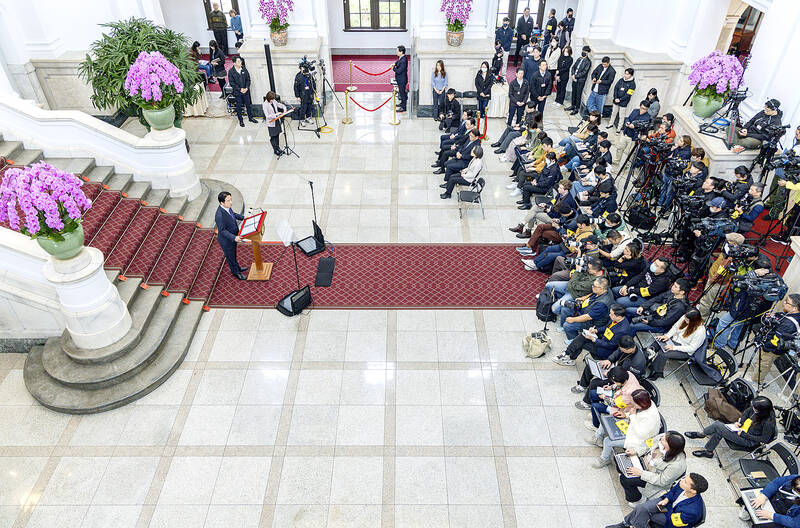The government aims to increase defense spending to at least 3 percent of GDP this year, President William Lai (賴清德) said yesterday, hours after US President Donald Trump again threatened tariffs on Taiwanese semiconductors.
At a news conference in Taipei following his first high-level national security meeting this year, Lai said the government would propose a special budget this year to increase the nation’s defense spending to more than 3 percent of GDP.
“Taiwan must firmly safeguard its national sovereignty, strengthen its resolve for self-defense and bolster its defense capabilities,” he said.

Photo: Presidential Office via AP
The president also vowed to double down on defense reforms and enhance civil protections in the face of growing threats from authoritarian regimes.
Lai’s plans to increase defense spending — which, if successful, would likely see Taipei purchasing more defense articles from Washington — reflects Taipei’s broader efforts to reduce the trade deficit with the US.
The US has approved US$26.26 billion of arms sales to Taiwan over the past eight years, with US$18.76 being approved during Trump’s first term from 2017 to 2021, Lai said.
Taiwan will accelerate efforts to strengthen its national defense capabilities, building on years of close collaboration between Taipei and Washington, he added.
Asked if he was concerned Taiwan could become a “pawn” in the US-China competition, Lai said the nation was “an indispensable member of the world and the region.”
“We are a player, not a pawn,” he said.
His remarks came just hours after Trump, speaking with reporters in Washington after signing a presidential memorandum paving the way for tariffs on US chip imports, reiterated his claim that Taiwan “took our [the US’] chip business away.”
Trump said that the pledged economic sanctions, which could take effect as early as April, would ensure “fair” and “reciprocal” trade, while reducing the US trade deficit in its dealings with other countries over the years.
Taiwan is in the top 10 list of countries with which the US has a trade deficit.
The plans to increase defense spending followed Trump’s comments during his presidential campaign that Taiwan should increase its defense budget significantly and pay the US for protection against China.
Over the past eight years under former president Tsai Ing-wen (蔡英文), the defense budget incrementally increased from NT$365.8 billion (US$11.2 billion) in 2016 to NT$606.8 billion last year. However, the spending still fell short of the 3 percent of GDP pledged by Tsai.
It remains to be seen whether the government’s pledged defense spending hike, which would require legislative approval, would materialize.
For this fiscal year, the Cabinet had earmarked NT$647 billion for national defense, amounting to 2.45 percent of GDP. However, NT$8.4 billion of that figure has been cut by the opposition-led legislature, with another NT$89.9 billion frozen, according to Directorate-General of Budget, Accounting and Statistics estimates.
The legislature has yet to finalize the central government budget plan it passed on Jan. 21 after adopting numerous budget cuts and freezes.

NATIONAL SECURITY THREAT: An official said that Guan Guan’s comments had gone beyond the threshold of free speech, as she advocated for the destruction of the ROC China-born media influencer Guan Guan’s (關關) residency permit has been revoked for repeatedly posting pro-China content that threatens national security, the National Immigration Agency said yesterday. Guan Guan has said many controversial things in her videos posted to Douyin (抖音), including “the red flag will soon be painted all over Taiwan” and “Taiwan is an inseparable part of China,” while expressing hope for expedited “reunification.” The agency received multiple reports alleging that Guan Guan had advocated for armed reunification last year. After investigating, the agency last month issued a notice requiring her to appear and account for her actions. Guan Guan appeared as required,

Japan and the Philippines yesterday signed a defense pact that would allow the tax-free provision of ammunition, fuel, food and other necessities when their forces stage joint training to boost deterrence against China’s growing aggression in the region and to bolster their preparation for natural disasters. Japan has faced increasing political, trade and security tensions with China, which was angered by Japanese Prime Minister Sanae Takaichi’s remark that a Chinese attack on Taiwan would be a survival-threatening situation for Japan, triggering a military response. Japan and the Philippines have also had separate territorial conflicts with Beijing in the East and South China

A strong cold air mass is expected to arrive tonight, bringing a change in weather and a drop in temperature, the Central Weather Administration (CWA) said. The coldest time would be early on Thursday morning, with temperatures in some areas dipping as low as 8°C, it said. Daytime highs yesterday were 22°C to 24°C in northern and eastern Taiwan, and about 25°C to 28°C in the central and southern regions, it said. However, nighttime lows would dip to about 15°C to 16°C in central and northern Taiwan as well as the northeast, and 17°C to 19°C elsewhere, it said. Tropical Storm Nokaen, currently

PAPERS, PLEASE: The gang exploited the high value of the passports, selling them at inflated prices to Chinese buyers, who would treat them as ‘invisibility cloaks’ The Yilan District Court has handed four members of a syndicate prison terms ranging from one year and two months to two years and two months for their involvement in a scheme to purchase Taiwanese passports and resell them abroad at a massive markup. A Chinese human smuggling syndicate purchased Taiwanese passports through local criminal networks, exploiting the passports’ visa-free travel privileges to turn a profit of more than 20 times the original price, the court said. Such criminal organizations enable people to impersonate Taiwanese when entering and exiting Taiwan and other countries, undermining social order and the credibility of the nation’s